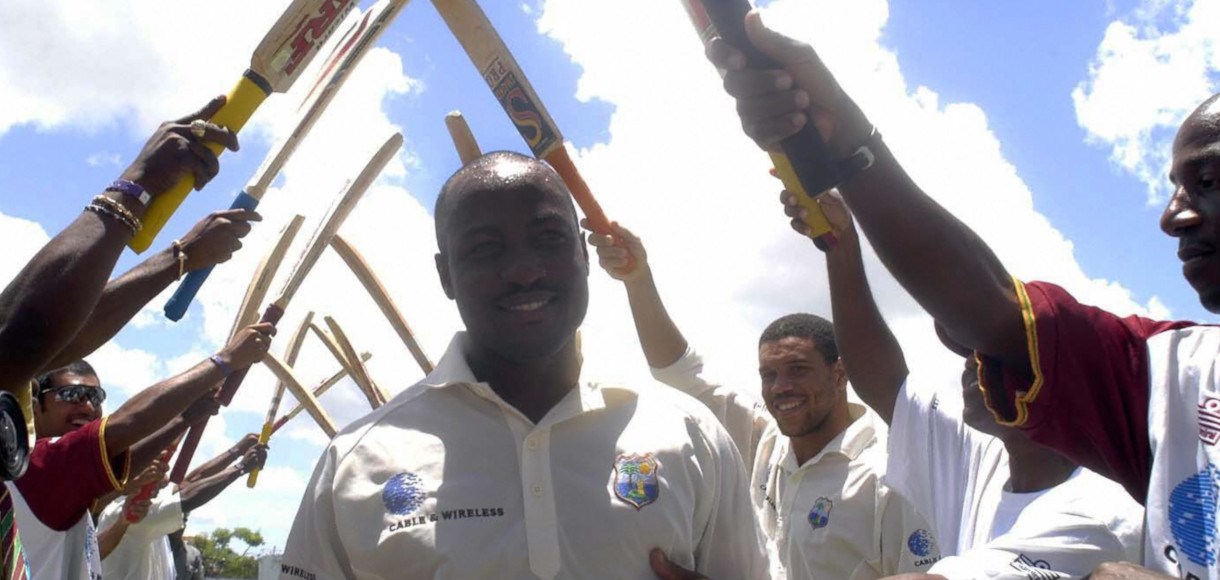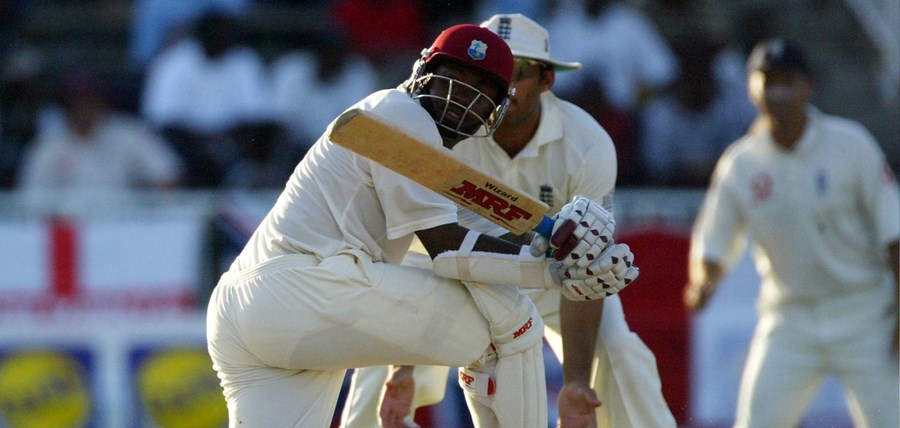The inside story of Brian Lara's record-breaking 400*

Gus Logie, West Indies coach when Lara compiled the highest Test score of all time, reflects on the innings and what was happening behind the scenes.
It was on 10 October 2003 that Matthew Hayden stole a crown that had belonged to the West Indies for 46 years.
The Australian opening batsmen smashed 380 against Zimbabwe in Perth, the highest individual score in Test-match history, surpassing Sir Garfield Sobers’ 365* against Pakistan in 1958 and Brian Lara’s 375 against England in 1994.
As it turned out, Hayden was only borrowing it.
The record is a source of pride in West Indian cricket, a recognition of the legendary cricketers that the region has produced, so Lara made it his intention to win it back.
“Brian was one of the first people to congratulate Matthew Hayden, but I think deep down he felt that the record was his,” says Gus Logie, coach of the West Indies when England visited in 2004, the series in which Lara would rewrite history for a second time.
“He knew what he had to do in order to truly be the best. For someone like Brian, who has a first-class 500, the appetite for big scores motivates him and inspires him, and it inspired so many young people in the game.
“There was sadness in the Caribbean when Hayden hit his 380, people were disappointed. Records are the kind of thing we talk about. Could we be part of history?”
It didn’t take long for Lara to put things right.
On 12 April – just 185 days after Hayden’s 380 – Lara swept England’s Gareth Batty to the fine-leg boundary to move to 384*, prompting revelry in the Antigua Recreation Ground stands and bringing the match to a halt as the England team, West Indies’ officials and camera crews rushed to surround him.
Twelve overs later, a swept single ticked him over to 400*. West Indies declared on 751-5 at the end of the over to finalise Lara’s 582-ball, 778-minute Test record that remains untouched to this day.
“It was something out of this world,” says Logie. “He went out there and really focused, and had the determination to battle on and face so much adversity.
“I think every one of us felt this was something unbelievable. However you want to slice it and dice it – you can talk about a flat pitch and make other excuses – he was Mr Incredible that day. A champion.”
Not that things had all been going Lara’s way.
England had won all of the three previous Tests to secure the four-match series with one to play. By Logie’s own admission, the hosts’ pre-match focus had simply been on avoiding a whitewash.
In those three matches, Lara had managed 100 runs at an average of just 16.67.
“Brian was under a bit of pressure for his job as captain,” Logie says. “But he always gets up for it, he’s mentally strong.
“He kept saying that he was hitting the ball well in the nets: ‘I’m feeling good it will come.’ That gave me confidence that a big score was coming, whether in this series or the next.”
After a day-and-a-half of batting, Lara ended day two on 313*, and his coach’s suspicions had been confirmed and more.
“It was a pitch that gave us the confidence that we could put on a good first-innings score,” Logie says.
“We felt we could go well, but I must admit that I didn’t quite see that innings coming.
“It was almost as if the stars were aligned. It was the same opposition as when he broke the record in 1994, so lots of things seemed to play in his favour so that his confidence level rose.”

But, even with his star player sensationally returning to form, Logie was not allowed to relax. There were calls for his side to declare overnight, to put the team ahead of an individual and maximise their chances of claiming a dead-rubber victory.
The coach is entirely comfortable with the decision to let Lara bat into day three, though.
“When we realised how close he was, I don’t think a declaration came into consideration,” Logie says.
“It was a collective decision. Had the series been in the balance, it might have been different. Brian would have made the decision that we can win the series.
“But if we had won a Test match as opposed to Brian scoring 400, I don’t think we’d be having this conversation. His 400 was news throughout the world – I don’t think one Test match win against England would have caused a stir.
“We had to give him the opportunity.”
Logie reflects on the overwhelming support the West Indian public offered to Lara that night – “I don’t think he slept at all for everybody wishing him well for the next day” – and remembers the tense atmosphere in the dressing room as play got under way the next morning.
An odd superstition adopted by cricketers is that every individual must sit still in the dressing room, so as not to tempt fate and cause a wicket to fall in the middle. This was no time to play games with the gods.
“We were all sitting in the same seat for quite a long time,” Logie says, laughing. “For two or three days, nobody moved a muscle.
“Anybody who tried to move would be reminded: ‘Stay where you are, stay where you are.’
“There was silence at times, there were ‘oohs’ and ‘aahs’ at times. It seems to be part and parcel of cricketing culture, the superstition side of it.”
It seemed to work.
“There were some anxious moments,” Logie admits. “There was a run out opportunity at one stage, and there was a caught-behind appeal when he was on over 300.
“But once he had crossed Matthew Hayden’s total, everybody was just like ‘woah’. He went boom, boom, boom, and it happened. We had witnessed something incredible.”
The longer Lara’s record continues, the better it gets.
Only Mahela Jayawardene has since threatened it – scoring 374 against South Africa in 2006 – while there has been just one innings of more than 303 since 2010.
Logie believes that the way the game is played now does not lend itself to innings long enough to get close to 400, with batsmen generally more impatient to score quick runs and often win games inside four days.
That, though, only cements the genius of Lara.
“If it was broken now, there would be some sadness,” Logie says. “Sadness not just for him, but for all of us as Caribbean people.
“But he would have been the first person to have done it, you can’t take that away from him. The first man to get to 400.
“It’s like the guy going on the moon for the first time. You talk about Neil Armstrong, but I can’t remember anybody else that has been since.”
Visit Betway's cricket betting page.



































